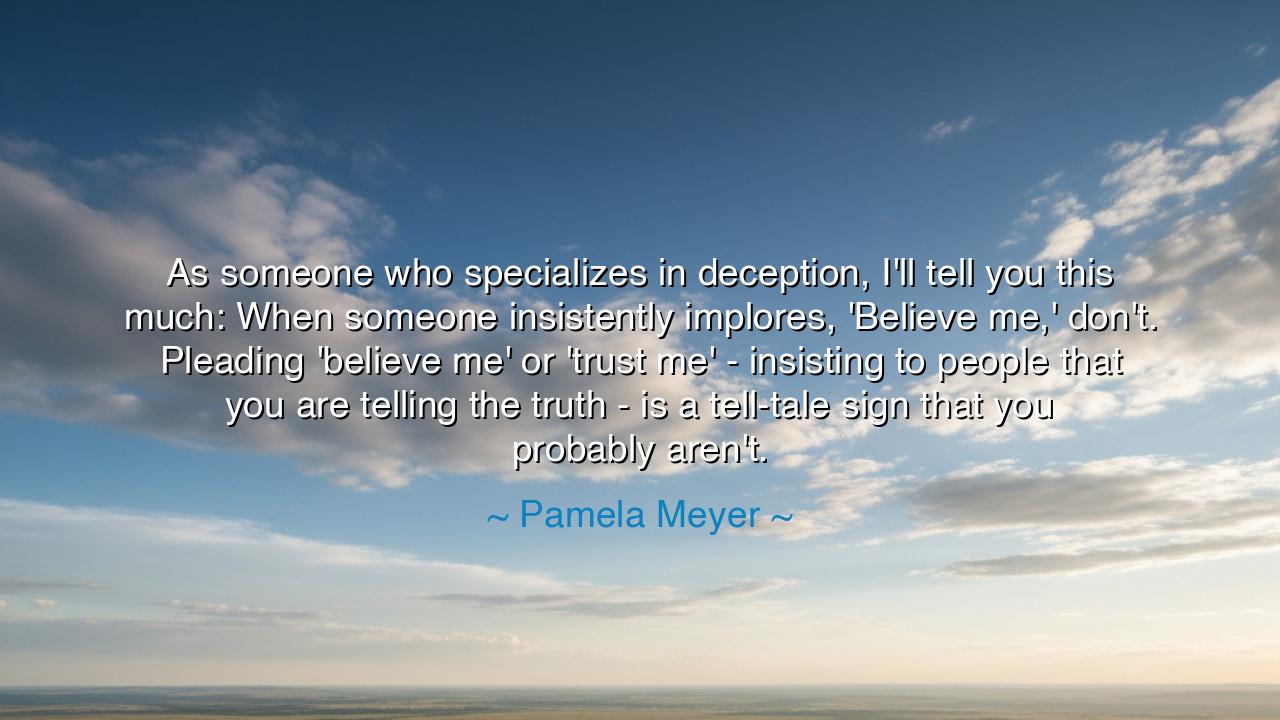
As someone who specializes in deception, I'll tell you this
As someone who specializes in deception, I'll tell you this much: When someone insistently implores, 'Believe me,' don't. Pleading 'believe me' or 'trust me' - insisting to people that you are telling the truth - is a tell-tale sign that you probably aren't.






Hear the piercing words of Pamela Meyer, watcher of lies and revealer of hidden truths: “As someone who specializes in deception, I’ll tell you this much: When someone insistently implores, ‘Believe me,’ don’t. Pleading ‘believe me’ or ‘trust me’—insisting to people that you are telling the truth—is a tell-tale sign that you probably aren’t.” These words, though drawn from the world of deception detection, carry the weight of an eternal teaching: that truth does not demand constant defense, and sincerity does not cry out for blind faith. It is the liar, not the honest man, who must repeatedly shout for trust.
The origin of these words lies in Meyer’s long study of deception, in which she observed the patterns of speech and behavior that betray falsehood. When one is truly honest, the strength of reality itself supports their words, and they speak plainly, without the need to beg for belief. But when one is false, when their heart knows it does not match their tongue, then they lean on phrases like “believe me” or “trust me” as crutches to hold up their crumbling story. Thus, Meyer reveals what the ancients long knew: words alone are not proof—deeds and consistency are the true measure of honesty.
History shines with examples of this truth. Recall the story of Richard Nixon, who during the Watergate scandal declared again and again to the American people that he was not a crook. His insistence was loud, but the louder he proclaimed, the more suspicion grew. In the end, his very denials became proof of his guilt, for they revealed his desperation. Contrast this with the quiet dignity of Abraham Lincoln, who rarely needed to proclaim his honesty, for his life itself bore witness. The people called him “Honest Abe,” not because he demanded belief, but because his actions over time spoke louder than any plea.
This is the paradox of truth: it does not need to be begged for, it needs only to be lived. A farmer does not need to insist that the sun has risen; he points to the dawn. A mother does not plead for belief in her love; she proves it through her sacrifice. So too in life: those who live in truth will not feel the need to cry “trust me,” for their trustworthiness will be evident in their constancy. It is the liar who grows frantic, weaving words upon words, hoping that insistence can substitute for substance.
Yet Meyer’s warning is not a call to suspicion of all, but to discernment. She teaches us not to be deceived by the smooth tongue, but to weigh words against actions, to test promises against patterns. Just as a wise merchant tests the coin by its ring, so must we test people by the harmony between their speech and their deeds. To believe blindly is folly; to test carefully is wisdom.
The lesson, then, is simple but profound: let trust be earned, not demanded. If you hear someone plead again and again for your belief, pause and look deeper. Do their actions match their words? Do they live the truth they claim? And in your own life, avoid the temptation to cry out for trust with words alone. Instead, let your honesty be proven daily through integrity, consistency, and humility. For it is not the loudest claim that wins trust, but the quiet steadfastness of a life lived truly.
Therefore, O seekers of wisdom, remember Meyer’s counsel: beware the one who implores you to “believe me,” for truth needs no such cloak. Judge men and women by the alignment of their words with their deeds, and seek always to live in such a way that your integrity is clear without demand. For in the end, trust is not seized by pleading—it is granted by those who see your truth shine through every act of your life.
–––






AAdministratorAdministrator
Welcome, honored guests. Please leave a comment, we will respond soon